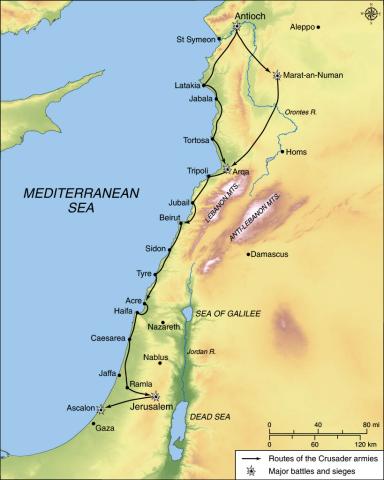The Battle of Ascalon
[10.39.10] Nostrī autem accēpērunt ēius stantarum, quod comparāvit comes dē Nortmannīā vīgintī marcās argentī, et dedit patriarchae, in Deī honōrem Sānctīque Sepulchrī. Ēnsem vērō emit quīdam sexāgintā bisantēīs. Superātī sunt itaque inimīcī nostrī, Deō annuente.
[10.39.11] Omnēs nāvēs terrārum pāgānōrum ibi aderant. Hominēs vērō quī intus erant, videntēs ammiralium fugientem cum suō exercitū, statim suspendērunt vēla, et impulērunt sē in alta maria. Reversī sunt nostrī ad tentōria eōrum, accēpēruntque innumera spolia aurī, argentī, omniumque bonōrum, omniumque animālium genera, ac omnium armōrum īnstrūmenta. Quae voluērunt asportārunt; reliqua igne cōnsūmpsērunt.
[10.39.12] Reversī sunt nostrī cum gaudiō Hierusalem, dēferentēs sēcum omnia bona, quae illīs erant necessāria. Hoc bellum āctum est prīdiē īdūs Augustī, largiente haec dominō nostrō Iēsū Chrīstō, cui est honor et glōria, nunc et semper et in saecula saeculōrum. Dicat omnis spīritus: Āmēn.
notes
(August 1099) Robert of Normandy buys al-Afdal's standard and gives it to the patriarch in Jerusalem. Someone else buys al-Afdal's sword. Fatimid ships in the harbor escape onto the open sea. The Egyptian camp is plundered, and the crusaders return to Jerusalem, giving thanks to Jesus Christ.
10.39.10
vīgintī marcās argentī: “for twenty marks of silver”; CL would prefer an ablative of value (AG § 416) for marchās.
10.39.11
Omnēs nāvēs terrārum pāgānōrum ibi aderant: omnēs is of course an exaggeration. The ships were presumably in Ascalon.
10.39.12
prīdiē īdūs Augustī: August 12, 1099.
vocabulary
10.39.10
stantarum –ī, n.: standard, banner (ML)
comparō (1): to purchase, buy
marca –ae, f.: mark (a coin) (ML)
ensis –is, m.: sword
annuō annuere annuī annūtum: to nod, assent
10.39.11
vēlum –ī, n.: sail
impellō impellere impulī impulsum: to strike against, push, smite, strike
asportō (1): to carry away, transport
10.39.12
largior largīrī largītus: to give generously, bestow

